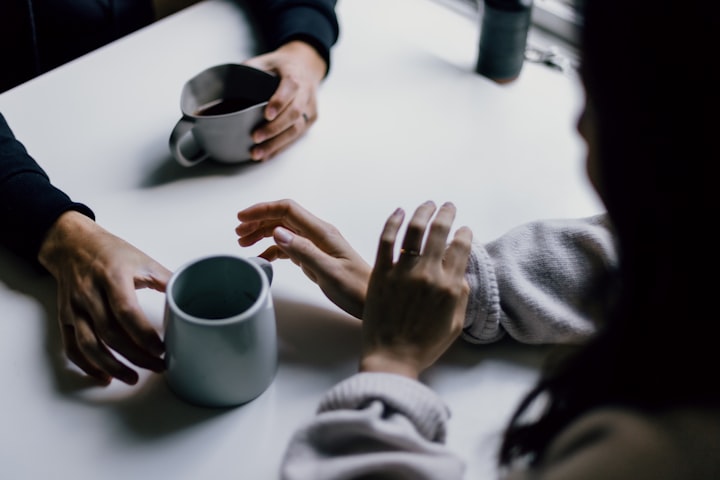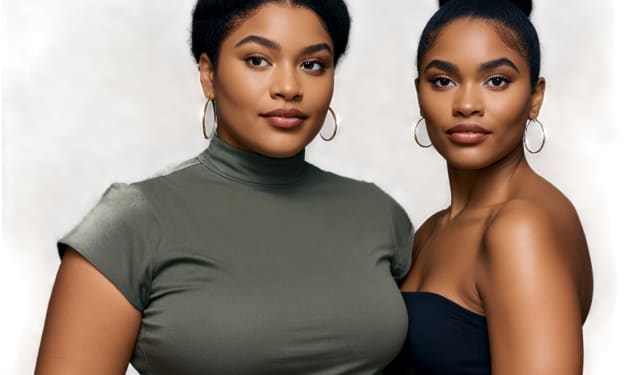
"It's not about race."
That was Abby's initial response to Layna after being shown a TikTok video of a black woman describing her experience with her adopted white child at Target.
Of course, it is easy to miss the signs. The subtle signs. It is not the 1800s anymore where most people would walk around blatantly saying "it's because you're black."
Obviously, times have changed, which is what Layna has spent the last few minutes trying to explain to Abby, with little success. Abby has always had polarized thinking, a black and white way of seeing the world (no pun intended), which Layna sees as such a privilege.
Ignorance is bliss after all.
"How can you possibly shut down the idea that this is a race issue before even thinking about it? If it was a white woman running through Target holding a white toddler, no one would give it a second thought," Layna explains to Abby.
These topics are ones that Layna and Abby typically enjoy discussing together, but today is different. Usually Abby's verbiage is not so dismissive. It caught Layna by utter surprise to hear her friend outright say the woman in the TikTok video did not have a race related experience. Layna and Abby can usually mitigate their difference of opinions quite respectfully, but this particular conversation is bothering Layna deeply.
"If anyone was running through the store with a kid, I'd be concerned and report it. How do you know the kid isn't being kidnapped if it is a white or black woman? It is a matter of safety," Abby rebuttals matter-of-factly.
Layna takes a deep breath before trying to piece together the words flying through her head. Sitting face to face on the couch, it is becoming progressively laborious to hide the frustration in her facial expression. Body language has always played against her when trying to hide her emotions. The last thing she wants is for this to turn into an argument. Once topics get heated between Layna and Abby, there is usually little hope of coming to a consensus.
When she feels she has developed a logical enough approach to decode this racially biased account to Abby, Layna begins. "If it was a matter of safety, why would two white women have cornered her in the bathroom? It is one thing to call security, but it is a whole 'nother thing to corner a black woman in the bathroom and the yell 'grab her'! Especially when the kid is saying 'mommy mommy mommy'! If the two white women would have paid attention for just a few seconds before acting on their bias, they would have seen that it was a mom and son interaction, or would have heard him calling her 'mommy'. This was obviously a race issue, not safety!" Layna elucidates, trying to not raise her voice.
"I really don't think it is. Do you know how big human trafficking and kidnapping is?" Abby insists.
Layna momentarily sees validity with Abby's statement, but refuses to consider this to be a non-racial issue. Layna replies, "Because she was a black woman with a white kid, the other women's first thoughts couldn't possibly have been that she was running a potty-training toddler to the bathroom. Let alone running with her own toddler. I bet you anything that if it was a white woman who had ran through Target with a white kid, there would have been more discretion. More benefit of the doubt given! But that goes out the window when it is a person of color in question. Ultimately, the assumption of guilt follows black woman the same way it does when a black man interacts with the police."
Layna's frustration lies with the fact that Abby cannot see why race influences this situation. As a Latina, Layna has had the privilege of not living through situations such as these when simply going to the supermarket, but she has experienced bias, prejudice and race issues of her own. Layna can empathize with what she believes the deeper implications of this black woman's experience was...
We are skeptical of you.
You are not welcome here.
You are undeserving of the benefit of the doubt.
We are watching.
You are guilty of something.
You are out of place.
You are probably up to something bad, even if it is the same thing the white lady is doing.
Unfortunately, Layna knows it is difficult to get someone to see this, the implications of racial bias, if they cannot empathize with the situation. If they have been privileged enough to not have lived a situation like this themselves.
"I see where you are coming from, I really do. I just really think race wasn't the main issue," Abby begins to explain. "If I were in the store, I would have reported it too if I saw someone running with a child, regardless of their skin color. I feel like it was more about safety than anything else. You remember when you saw that white guy with a large suspicious bag at school and you reported it? When it comes to safety, race isn't the issue or else you probably wouldn't have reported it. It just isn't what I think about when I see a situation," Abby contests after allowing Layna to finish explaining her side.
Layna knows that Abby is not a racist person. That she sees people equally, but that is part of the problem. Asserting that everyone is equal in a world where they are not treated as equal is just as damaging as being an outright racist. That is what Layna believes, but she has never found the right wording to explain this to Abby.
How do you tell a non-racist person who loves everyone that they are still contributing to systemic racism without offending them?
If anything, Abby views herself as quite progressive for being able to look past skin color, especially after growing up in a Southern, rather racist area. After all, it is not like Abby is harming any particular person with her views of superficial equality, but Layna believes Abby is hurting the bigger issue by not allowing herself to see how the inequalities and biases play out in everyday situations.
"I mean this in the nicest and most respectful way possible because I love you, but I think you need to check your privilege if you truly believe this situation has nothing to do with race." Layna sees her friend's face drop as soon as she says this, despite the fact that she meant no harm. She cares about her friend and simply wants to correct her wayward thinking.
So she continues. "Just because you can't see it right away, that doesn't mean it isn't a factor at play. Most racist encounters are subtle. Not every racist encounter is a black man being shot by a police officer. It doesn't have to be that large scale to be racism. That's why systemic racism is such a big problem. It is subtle. A silent offender."
Abby seems to understand this and her face softens. This is different for Abby, too. She has never felt like she's on the receiving end of these types of conversations before. Abby believes herself to be an accepting and loving person toward everyone, regardless of race. After all, one of her best friends is black. If there was a racist issue at hand, she'd be able to tell, right?
Despite Layna's longwinded expositions, Abby still sees this as more of a safety issue than anything else. "Layna, I think we just see this differently. I respect you and everything you have to say, but when push comes to shove, the child's safety was the bigger issue here. If I were there, I would have been concerned about the kid. There is no way for someone on the outside to have known the kid was adopted. Or if it was her kid at all. I'll admit, there is a race aspect here that maybe I don't see or fully understand as well as you do, but I don't think race was the entire issue like you're making it out to be."
This catches Layna by surprise. She simply expected Abby to disagree and that she would have to explain herself all over again to make her point stick. But Abby isn't disagreeing. She is actually bringing in more perspective.
Abby continues. "I understand where you are coming from, but there are too many things about the situation that we just don't know. We can't really know why the two white women were concerned. And yeah, maybe they could've handled themselves better. But how do we know the kid wasn't crying when the mom was running with him to the bathroom. If you saw someone running with a kid that was crying and screaming, wouldn't you be concerned, regardless of skin color? Even more so if the kid didn't look like it was hers?"
Layna pauses and eventually admits that she would be concerned in a situation like that. Suddenly, she is not so argumentative. She did not truly see Abby's point until now. Granted, Abby's initial statement of completely dismissing race as a factor at all didn't help, but Layna thinks that Abby brings a valid point.
Maybe the kid could have seemed fidgety to the two white ladies if he was about to have a bathroom emergency. Maybe the two white ladies thought about things the same way as Abby. And maybe it was also racism at play, whether it was intentional or not.
Layna remembers that they don't have the full story. That her and Abby were not present, let alone involved, to truly know the experience.
Layna knows race is a big player in this game. There's no changing her mind on that, but she now realizes there could be more to consider. That maybe she rushed to the race issue as the sole issue instead of seeing it as the driving force. Doesn't make the situation much better, but it adds perspective.
"Maybe we need to agree to disagree," Layna mentions. "Not on the matter of racism, because there is no 'agreeing to disagree' about human rights issues, but on the fact that we can't fully know why the two white ladies reacted the way they did. I still believe prejudice was largely a factor, but we cannot possibly know all the other factors."
"You're right. It could've been race and safety related, and then some. We can't truly know. But I get where you're coming from about the race thing," Abby replies, relieved to finally find common ground in this strenuous conversation.
"I appreciate you giving your perspective, and I'm sorry for not letting you fully share your thoughts at first. This is why talking about these things is so important," Layna responds.
Abby visibly accepts Layna's apology and takes her hand endearingly, which brings smiles to both their faces. They know this won't be their last conversation on the topic. That social issues like these are continual conversations and learning opportunities, but talking through them ultimately brings them closer together as friends.
------------------------------------------
This story was inspired by a video posted by @raisingcultures on TikTok. The creator shared her story of how this bathroom incident truly happened to her, so I wanted to give credit for the initial inspiration. Visit her TikTok to learn more about the fostering to adopt process!
About the Creator
Nani Cruz
As a 23 year old grad school student, I spend a lot of time writing academically. Now I’m taking time to write creatively and enjoy creating stories about whatever makes me happy.






Comments
There are no comments for this story
Be the first to respond and start the conversation.